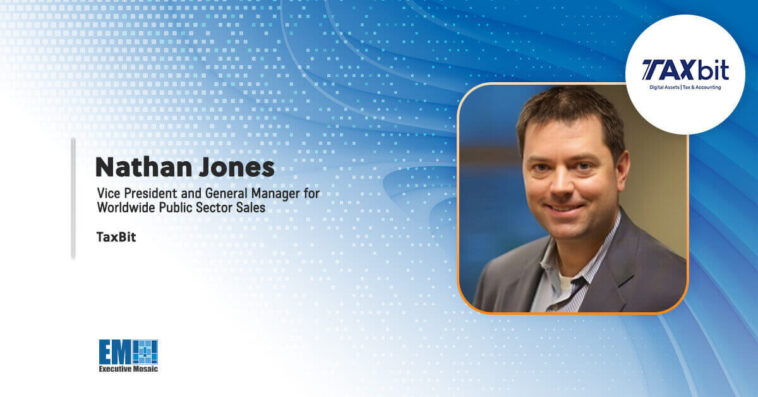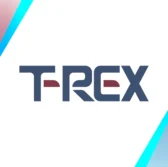Digital asset adoption continues to grow exponentially, and pending Treasury regulations will establish governance for how this asset class should be reported on for tax purposes. As the digital asset industry awaits final regulations, TaxBit is among the firms working at the intersection of industry and government to provide solutions to enterprises, exchanges and agencies alike that can help them navigate this complex landscape.
Nathan Jones, vice president and general manager for worldwide public sector sales at TaxBit, recently sat down with ExecutiveBiz for a dialogue on what it’s like to work with a company that is defining digital asset compliance in the U.S. and abroad. In our Spotlight interview, he explained how this unique effort requires blending time-tested financial and compliance best practices with an appreciation of the unique workings and benefits of blockchain technology.
Can you tell us about your role in helping companies prepare for compliance ahead of enforcement of new digital asset tax regulations?
I’ve spent the majority of my career in leadership roles in the public sector space, namely in setting up Red Hat’s federal business. But I’ve always been interested in cryptocurrency, digital assets and blockchain, and in my current role at TaxBit I get to combine my past experience with a passion for blockchain and its potential.
As is apparent from my time at Red Hat, I’m a major advocate of open source technology and I see parallels between open source and blockchain. As a blockchain-based currency, I see massive potential in digital assets, but I do understand that a crucial part of any financial technology ecosystem is proper regulatory guidance and taxation.
Given my background, it’s a unique and exciting opportunity to be working now for a company at the forefront of conversations that are setting the standards and frameworks to further legitimize digital assets. To accelerate these developments, it’s essential to build solutions that can facilitate and simplify compliance with Treasury and IRS reporting requirements so we can further enable digital assets for the global economy.
Could you share a quick overview of what new federal regulations mean for the industry?
The Treasury Department and IRS are committed to understanding this asset class and implementing regulations that align with the unique nuances associated with digital assets. Cryptocurrencies operate quite differently from traditional asset classes, so the overarching goal is to craft rules that promote transparency, trust and proper taxation.
As part of that effort, the federal government has been actively involving industry stakeholders, including a comment period last fall that elicited significant feedback from companies that deal with cryptocurrencies. A major focus is around bringing clarity and guidance to areas where there still may be confusion over how to apply traditional tax policy and reporting frameworks to digital assets.
For instance, the IRS is instituting new 1099 reporting requirements for crypto asset brokers; and so work is underway to clarify what, exactly, constitutes a “broker” for crypto transactions that may be carried out via autonomous protocols on decentralized computer networks. Bringing clarity and specificity to questions like these will help shape the final policy frameworks that will need to be enforced.
How is your team collaborating with enforcement agencies to facilitate the effort toward compliance?
We take a very proactive approach to collaborating with enforcement agencies, and oftentimes that collaboration includes the sharing of best practices and talent. In fact, a few members of our teams have work experience in the public sector at agencies including IRS, the Department of Justice and the Financial Accounting Standards Board, as well as on Capitol Hill. We regularly participate in a variety of public forums with the IRS and other federal regulatory agencies, and this engagement extends to partnerships at the state level and even internationally.
We view our role as a facilitator of industry and government collaboration to better realize the full potential of digital assets through a shared effort towards appropriate compliance. Compliance is essential to the maturation of the digital asset ecosystem, and it’s essential that industry and government perspectives are important to the responsible regulation of this asset class.
Our focus as a company is to set the status quo for digital asset compliance, which entails building solutions to support ever-evolving regulatory standards. This means ensuring that we provide a modern user experience that manages complexity, reduces manual work and ensures operational efficiency for end-to-end compliance. Otherwise, navigating the complexities of digital asset compliance will hinder further adoption of this asset class.
Looking ahead, what should organizations keep in mind as future enforcement deadlines approach?
It’s important to remember that the IRS is looking to close an estimated $50B crypto tax gap. When digital asset tax rules go into effect, enforcement will be addressing a massive digital economy within US borders; and one that is likely to scale even further.
To properly apply enforcement to this growing market, public sector organizations will need to invest in strategic partnerships that can help them achieve this goal. Similarly, enterprises will need to embrace a solution that can account for evolving compliance requirements at scale.
As a conduit between public sector and industry, we’re uniquely positioned to help both public sector agencies and enterprises alike. Our goal is to create an environment in which we can have open and honest collaboration with U.S. enforcement agencies, and willing compliance from industry players.





